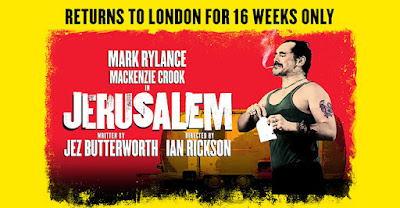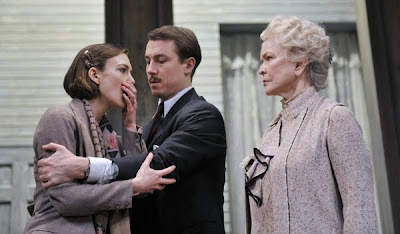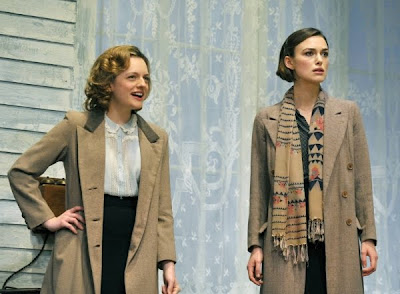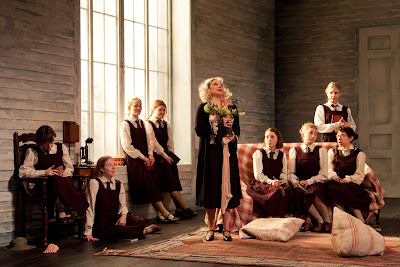He's still at it... Mark Rylance first played Johnny 'Rooster' Byron in 2009 at the Royal Court, transferring to the Apollo in 2010, to Broadway in 2011 then back to the Apollo later that year when I saw it and now it has returned with some of the original cast - and of course Rylance.
I was surprised how much of the play I remembered after eleven years but it is a strange experience to see a State Of The Nation play thirteen years after it was written. It still makes it's points about the disenfranchised Wiltshire under-class, suspicious of the encrouching housing estates that are edging ever-closer to the surrounding woods where Johnny 'Rooster' Byron's dilapidated caravan is a magnet for them to party and lounge around listening to Byron's outlandish encounters.
Among his acolytes are part-time DJ part-time plasterer Ginger, Lee who is leaving for Australia, two bored teen girls Pea and Tanya and the oafish abattoir worker Davey. Also hanging around are the listless ''grown-ups" The Professor and Wesley, the local pub owner. But they are all threatened by Rooster's ignoring of the local council's attempts to evict him, and the vengeful threats of a local man who suspects his teenage daughter is hiding out in the caravan. Johnny believes that the giants of Olde England will protect him from danger - but surely this is one story too far...
Ian Rickson has again directed with a sure hand, keeping the locals' outlandishness on the side of reality - no one ever suggests a cartoonish attitude. They all do work as an ensemble but it's definitely an ensemble - plus a lead player. As I wrote eleven years ago "Rooster represents the anarchic, subversive and pagan side of England becoming more and more threatened by the advance of the dull grey stupidity of the modern world. Jez Butterworth and Rylance have stated in interview that the character of Rooser was further worked on during the preview period at the Royal Court and it shows. Rooster almost seems to have grown beyond the play and all the characters opposing him are made as unsympathetic as possible."
If anything Rylance's performance has got bigger with as much emphasis on his many bits of business, his way of walking, even the hesitations and pauses seem to be overly-theatrical... but I cannot imagine seeing this without him sweeping the production around like a cloak. There have been productions of course without him - Jasper Britton played it in a production at Newbury - but it must seem a very different play.
As before I really liked Mackenzie Crook as Ginger, Rooster's supposed best friend, but Crook effortlessy suggests the character's emptiness inside. I also liked Gerard Horan as the bored pub manager Wesley, needing cocaine to get through being a Morris dancer and Alan David, returning from the first cast as the vague Professor. The only weak performance was Indra Ové as Rooster's estranged partner, her over-emphatic performance stood out for all the wrong reasons.
Butterworth's strangely gripping play again has Ultz's cramped, realistic forest set and Mimi Jordan Sherin's atmospheric lighting. I suspect this will be Rylance's last outing as Rooster so see his Olivier and Tony Award-winning performance while you can. Although I wouldn't put it past him to do it again in another eleven years time...






















